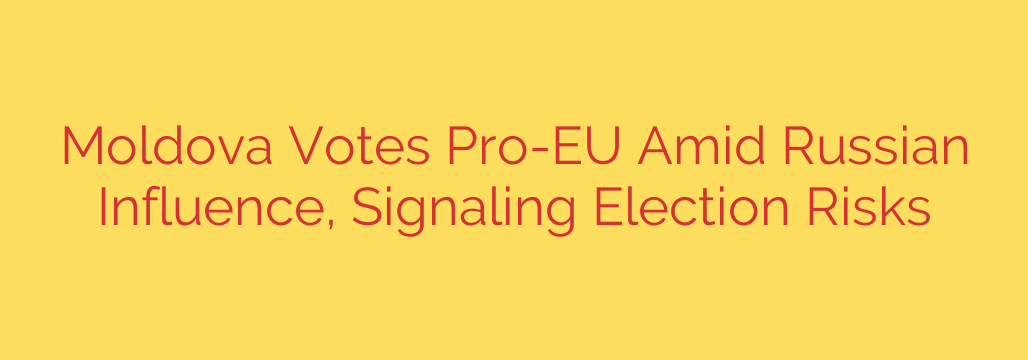
Moldova Chooses a Pro-EU Future, Exposing Russian Election Interference Tactics
In a significant geopolitical development, Moldova has decisively cast its vote in favor of a pro-European Union path, marking a pivotal moment in the nation’s history. This outcome represents more than just an election result; it is a clear statement of intent to align with Western democratic values and a powerful rejection of persistent Russian influence. The election process itself served as a case study in the modern challenges facing democracies, highlighting the sophisticated methods used to interfere in sovereign political affairs.
The vote confirms that a majority of Moldovans see their future prosperity and security intrinsically linked to Europe. However, this pro-EU mandate was achieved despite a coordinated and multifaceted campaign of foreign interference designed to sway public opinion and destabilize the country. The tactics employed offer crucial lessons for nations worldwide on the nature of hybrid threats in the 21st century.
Unmasking a Campaign of Disinformation and Hybrid Threats
The efforts to disrupt Moldova’s democratic process were systematic and aggressive. Foreign actors, primarily linked to Russia, deployed a range of strategies aimed at undermining trust in the government and pushing a pro-Kremlin narrative. These tactics were not limited to a single approach but formed a comprehensive “hybrid warfare” strategy.
Key methods of interference included:
- Widespread Disinformation Campaigns: Sophisticated networks utilized social media and messaging apps to spread false narratives, conspiracy theories, and inflammatory content. This digital propaganda was specifically designed to exploit social divisions, erode trust in democratic institutions, and create an atmosphere of chaos and uncertainty.
- Cyberattacks on Critical Infrastructure: Government websites, state institutions, and critical infrastructure faced a barrage of cyberattacks leading up to the vote. These attacks aimed to disrupt essential services and project an image of a weak and incapable state, thereby shaking public confidence in the pro-EU leadership.
- Economic and Energy Pressure: Russia has long used its position as a primary energy supplier to exert political leverage. By threatening to manipulate gas supplies and prices, Moscow sought to create economic hardship and fuel public discontent, hoping citizens would blame the pro-Western government for their struggles.
- Covert Funding of Political Proxies: Significant financial resources were reportedly funneled to pro-Russian political parties, activists, and media outlets within Moldova. This support allowed them to organize protests, run extensive advertising campaigns, and amplify anti-EU messaging, creating the illusion of widespread popular opposition.
Building Resilience: Lessons in Defending Democracy
Moldova’s ability to withstand this immense pressure and deliver a pro-EU result provides a valuable blueprint for strengthening democratic resilience. The nation’s response underscores the importance of a proactive and multi-layered defense strategy. For any country facing similar threats, several key takeaways are clear.
Actionable Security and Governance Tips:
- Enhance National Cybersecurity: Investing in robust cybersecurity infrastructure is non-negotiable. This includes protecting government networks, election systems, and critical infrastructure from intrusion and disruption. Regular security audits and collaboration with international partners are essential.
- Promote Media and Digital Literacy: An informed public is the first line of defense against disinformation. Governments and civil society organizations must work to educate citizens on how to identify fake news, verify sources, and understand the tactics of manipulators. This empowers individuals to make decisions based on facts, not falsehoods.
- Increase Transparency in Political Financing: Strict laws and enforcement mechanisms are needed to expose and prevent illicit foreign money from influencing domestic politics. Full transparency in campaign and party funding makes it significantly harder for external actors to secretly back their preferred candidates.
- Strengthen International Alliances: Moldova’s resilience was bolstered by its strong partnerships with the European Union and other Western nations. This collaboration provides vital intelligence sharing, technical support, and diplomatic backing, sending a clear signal that the nation is not isolated.
The Path Forward for Moldova and Europe
While the election result is a victory for Moldova’s sovereignty, the struggle is far from over. The nation remains a primary target for destabilization efforts, and its path toward full EU integration will be fraught with challenges. The pro-European government must now deliver on its promises of reform, economic growth, and anti-corruption measures to solidify public support.
For the European Union, Moldova’s vote is both an opportunity and a responsibility. It is a testament to the enduring appeal of the European project. Brussels and its member states must now provide tangible economic, technical, and security assistance to help Moldova consolidate its democratic gains and defend itself against future interference.
Ultimately, Moldova’s experience is a stark reminder that election integrity is a continuous battleground. The nation’s decisive choice for a European future demonstrates that with vigilance, public awareness, and strong alliances, it is possible to uphold democratic values in the face of persistent external threats.
Source: https://securityaffairs.com/182743/uncategorized/despite-russian-influence-moldova-votes-pro-eu-highlighting-future-election-risks.html








